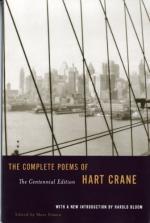|
This section contains 4,874 words (approx. 17 pages at 300 words per page) |

|
SOURCE: "Hart Crane's Myth: The Brooklyn Bridge," in American Literature, Vol. XXXIX, No. 1, March, 1967, pp. 75-86.
In the following essay, Arpad attempts to "uncover the Platonic sources" for Crane's "myth of the Brooklyn Bridge. "
One striking feature of Hart Crane's The Bridge is the poet's seemingly unorthodox conception of myth. Although several scholars have made known Crane's use of myth, they have not concerned themselves with exposing the poem as myth—an idea explicit in its dedicatory proem. Furthermore, although various critics have been successful in establishing Crane as a poet by equating his Platonic idealism with romantic mysticism, this approach has not proved precise enough to lend total coherence to the symbolism, the metaphysical imagery, and the structure of the poem, nor in particular, to explain the poet's use of the term myth.1 By emphasizing, however, Crane's Platonism—by opposing it to notions of romantic mysticism—one...
|
This section contains 4,874 words (approx. 17 pages at 300 words per page) |

|


